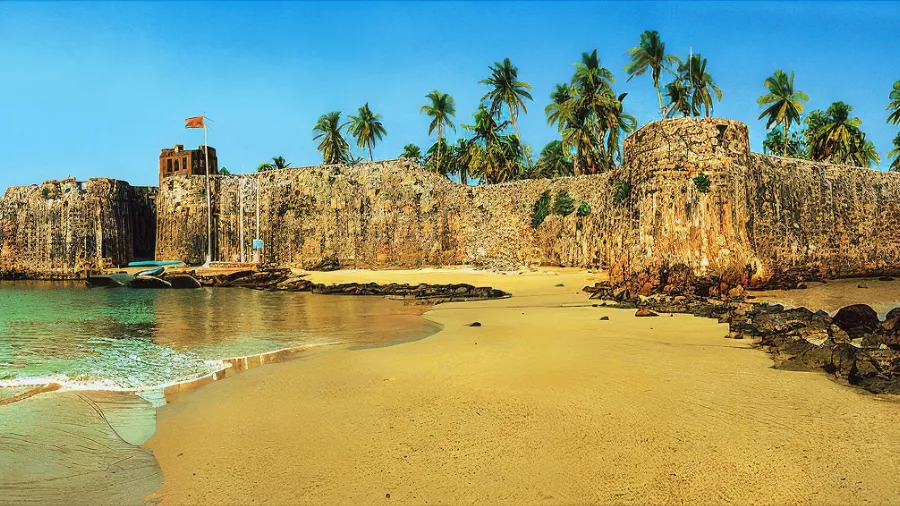Sindhudurg Fort: A Complete Guide to History, Trekking, and Spiritual Significance
Prabhuling jiroli
Sindhudurg Fort, located on the shores of the Arabian Sea in Maharashtra, is a marvel of historical architecture and military strategy. Built by the legendary warrior king Chhatrapati Shivaji Maharaj in the 17th century, the fort has a rich history and is a testament to the Maratha Empire's resilience. This blog explores the fort's extensive history, practical trekking information, and essential tips for visitors.

1. Complete History of Sindhudurg Fort
Ancient Beginnings
Sindhudurg Fort, constructed between 1664 and 1667, was strategically built on Kurte Island to protect the western coast of India from foreign invasions. Shivaji Maharaj aimed to establish a formidable naval presence, and the fort served as a key maritime stronghold for the Maratha Empire. Its location was chosen for its natural defenses, making it nearly impregnable.
Historical Significance
The fort is notable not just for its architecture but also for its role in the expansion of the Maratha naval power. The fort housed a significant number of cannons and was equipped to defend against British and Portuguese threats. Over the years, it witnessed various battles and played a crucial role in securing the region's safety.
The fort’s architecture features a blend of Hindu and Islamic styles, showcasing the cultural diversity of the period. It includes numerous temples, bastions, and even a few freshwater wells, which were crucial for sustaining the garrison stationed there.
2. Current Information
Fort Architecture and Features
-
Gates: Sindhudurg Fort has several entrances, with the main gate known as the Nagar Khind. This gate is adorned with intricate carvings and inscriptions, reflecting the craftsmanship of that era.
-
Towers: Key structures within the fort include the Ambarkhana (storage rooms), Bastions, and the Lighthouse. The fort's walls are lined with bastions that offer stunning views of the Arabian Sea.
Temples:
The fort houses temples dedicated to Lord Shiva and Lord Ganesha, where devotees come to seek blessings. The temple of Shree Shivaji Maharaj within the fort is particularly revered.

3. How to Reach Sindhudurg Fort
By Road:
Sindhudurg Fort is located in Malvan, approximately 500 km from Mumbai and 380 km from Pune. The fort can be reached via NH66, which offers a scenic drive along the coast.
By Train:
The nearest railway station is Kudal, about 30 km from Malvan. From Kudal, local transport options like taxis and buses are available to reach Malvan.
By Air:
The nearest airport is Dabolim Airport in Goa, located approximately 100 km away. From the airport, you can hire a taxi to Malvan.

4. Trekking Information
Trekking Routes:
While Sindhudurg Fort is primarily accessed by boat from Malvan, trekking routes are available for adventurous souls. The trek to the fort offers scenic views and can be started from Malvan or nearby beaches.
Trek Difficulty:
The trek is generally easy to moderate, suitable for beginners and families. However, caution is advised during the monsoon season when the terrain can become slippery.
5. What to Do
- Explore the Fort: Wander through the fort's ruins, explore the bastions, and enjoy the stunning views of the Arabian Sea.
- Visit the Temples: Spend time at the temples within the fort, offering a spiritual experience.
- Enjoy Water Sports: Malvan is famous for its water sports like scuba diving, snorkeling, and jet skiing.
6. What Not to Do
- Avoid Littering: Respect the natural beauty of the area by carrying back all waste.
- Do Not Disturb Wildlife: Be mindful of the local fauna and flora during your visit.
- Don’t Trek Alone: It’s safer to explore in groups or with a guide, especially if you’re unfamiliar with the area.
7. What to Carry
- Essentials: Water, snacks, a first-aid kit, and personal medications.
- Clothing: Wear comfortable shoes and weather-appropriate clothing.
- Equipment: A camera for photography, binoculars for birdwatching, and a flashlight for exploring.
8. When to Visit
The best time to visit Sindhudurg Fort is from October to March, when the weather is cool and pleasant. The monsoon season (June to September) transforms the landscape but can make trekking challenging.
9. Conclusion
Sindhudurg Fort is not only a historical marvel but also a beautiful destination for trekking and spiritual exploration. With its rich heritage, stunning architecture, and breathtaking views, it promises an unforgettable experience for all who visit. As you explore the fort and its surroundings, you will be reminded of the valor and ingenuity of the Maratha Empire and the natural beauty that Maharashtra has to offer.
